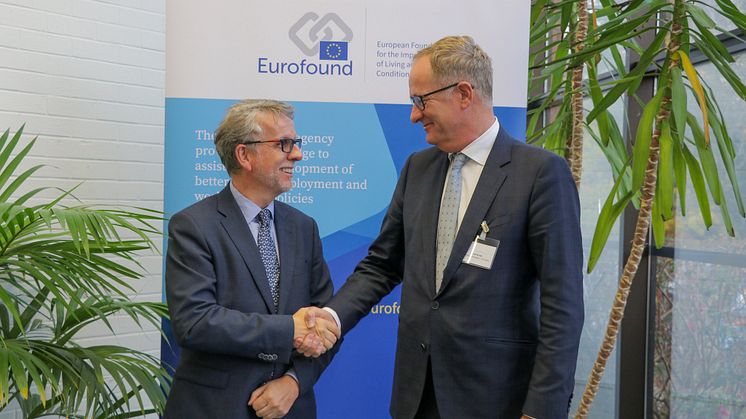New forms of employment in Europe – How new is new?
Standard employment is not simply being replaced by non-standard work; employment is becoming more diverse, and policy must accordingly become more tailored.

Standard employment is not simply being replaced by non-standard work; employment is becoming more diverse, and policy must accordingly become more tailored.

Stefan Gran has been elected Chair of Eurofound’s Management Board during the third meeting of the Board on 6 November 2020. He takes over from outgoing chair Aviana Bulgarelli, Ministry of Labour and Social Policies (Ministero del Lavoro, della Salute), Italy.

Eurofound’s new flagship report ‘Challenges and prospects in the EU: Industrial relations Developments 2015-2019’ provides an overview of developments in industrial relations and social dialogue in recent years, prior to the COVID-19 outbreak.

Eurofound has focused on Europe's immediate social, economic and labour market priorities and its developing role over the coming four years with the publication of its Programming document 2021-2024.

An ageing Europe and rising public expenditure on long-term care have signalled for some time that the fundamentals of care provision need to be addressed. However, the shocking death toll in care homes during the COVID-19 pandemic and the fact that many long-term care services were ill-equipped to protect their vulnerable users have lately focused the public mind on the issue.

At the end of his term as Executive Director on 30 November 2020, we engaged in a socially distant interview with Juan Menéndez-Valdés to review the last decade, his thoughts on Europe and his hopes for Eurofound.

The COVID-19 crisis has led to a doubling of restructuring job loss in the first half of 2020. The new European Restructuring Monitor ‘ERM report 2020: Restructuring across borders’ reviews recent restructuring activity in the EU, from January 2019 up to and including the first impacts of the COVID-19 crisis. It also presents an analysis of transnational restructuring cases.

The gender pay gap in gross hourly earnings in the EU was 14.8% in 2018. To help combat discriminatory pay practices by employers, the European Commission recommended in 2014 the introduction of pay transparency measures in all Member States. But more than half still have not implemented any such measures. Where do Member States currently stand on the agenda?

According to the recently published European Company Survey 2019 by EU agencies Eurofound and Cedefop, almost all managers (96%) agree training is important for employees to do their current job and most workplaces in the EU offer at least some training, yet only a small number – 9% – offer comprehensive training and learning opportunities to most of their employees.

The #EurofoundCompanySurvey ECS 2019 demonstrates that companies can design their workplace practices to help generate outcomes that benefit both workers and employers. Eurofound is organising a live #AskTheExpert webinar session on 29 October to delve into the European Company Survey 2019 findings relating to skills.

New data from Eurofound’s European Company Survey (ECS) show that two-thirds of workers (private sector, with more than 10 employees, EU27) are estimated to have their wages set via a collective wage agreement. Bargaining coverage is substantially higher in countries where there are sectoral agreements and where these are frequently extended to non-covered companies or workers.

Young people are overrepresented in the sectors hit hardest by COVID-19 restrictions, such as retail, travel and hospitality. According to Eurofound’s ‘Living, working and COVID-19’ survey of people in Europe, 11% of respondents aged 18–29 lost their jobs during the pandemic, compared to 8% of workers over 30.
